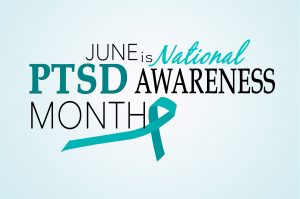June is Post-Traumatic Stress Disorder (PTSD) Awareness Month
 Managing trauma is no easy task, and at times it takes the strength of a lion. PTSD is a mental health problem that some people develop after experiencing or witnessing a life-threatening event, like combat, a natural disaster, a car accident, or sexual assault. It’s completely normal to have unsettling memories or have trouble sleeping after these type of life altering events. But if symptoms last more than a few months, it may be PTSD.
Managing trauma is no easy task, and at times it takes the strength of a lion. PTSD is a mental health problem that some people develop after experiencing or witnessing a life-threatening event, like combat, a natural disaster, a car accident, or sexual assault. It’s completely normal to have unsettling memories or have trouble sleeping after these type of life altering events. But if symptoms last more than a few months, it may be PTSD.
The great news is that there are effective treatments and ultimately PTSD can be managed. With treatment, trauma survivors are able to feel safe in the world and live happy and productive lives.
Here at WVoP we are committed to raising mental health awareness, but also to finding solutions. Connect with us for access to free mental health care for women veterans.
Effective treatments for PTSD includes different types of trauma-focused psychotherapies. “Trauma-focused” is a term that means the treatment focuses on the memory of the traumatic event or its meaning. These treatments use different techniques to help you dissect and process your traumatic experience. Some involve visualizing, talking, or thinking about the traumatic memory while others focus on changing unhelpful beliefs about the trauma.
In PTSD therapy, you and your therapist work together to set goals and develop new skills. However, not all of us have the resources for therapy and many of us aren’t even certain how to take the first step. No worries, you’re not alone! Managing traumatic stress does not always require a therapist with a long couch, sometimes it simply requires space and energy — even add a friend or two! The work may be hard, but the outcome will be worth it. This month, if you are a trauma survivor, we encourage you to try a few of these trauma-focused psychotherapies. Below is a list of techniques that research shows to have the best results with managing traumatic stress:
- Prolonged Exposure (PE)
Teaches you how to gain control by facing your negative feelings. It involves talking about your trauma with a provider and doing some of the things you have avoided since the trauma. - Cognitive Processing Therapy (CPT)
Teaches you to reframe negative thoughts about the trauma. It involves talking with your provider about your negative thoughts and doing short writing assignments. - Eye Movement Desensitization and Reprocessing (EMDR)
Helps you process and make sense of your trauma. It involves calling the trauma to mind while paying attention to a back-and-forth movement or sound (like a finger waving side to side, a light, or a tone).

